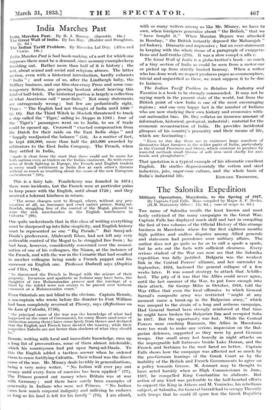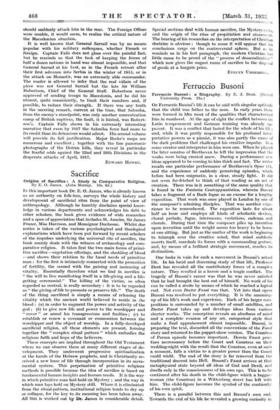The Salonika Expedition
Military Operations, Macedonia, to the Spring of 1917. By Captain Cyril Falls. Maps compiled by Major A. F. Becko.
(H.M. Stationery Office : 12s. 6d. ; case of maps 5s. Od.)
Tnn name of Salonika recalls the least known and most hotly criticized of the many campaigns in the Great War.
Captain Falls has displayed much skill and tact in compiling the first of two volumes of the Official History of this strange business in Macedonia where for the first eighteen months high politics and endless disputes among Allied generals and statesmen had precedence over military affairs. The
author does not go quite so far as to call a spade a spade, but he sets out the facts with sufficient clearness. Every serious student of the War can now see that the Salonika expedition was fully justified. Bulgaria was the weakest link in the Central Powers' alliance, and her surrender in September, 1918, hastened the general collapse of a few weeks later. It was sound strategy to attack that Achilles heel. The pity of it was that the Allies could never agree, until the last summer of the War, to put force enough into their attack. Sir George Milne in October, 1916, told the War Office that even the local offensive to which General Sarrail's composite army was restricted " might at any moment cause a break-up in the Bulgarian army," which was unequal to the strain of a long and arduous campaign. Had General Sarrail been strongly reinforced at that time he might have broken the Bulgarian line and occupied Sofia in 1917. But the opportunity was lost. While the Central Powers were crushing Rumania, the Allies in Macedonia were too weak to make any serious impression on the Bul- garian defences, supported as they were by good German troops. Our small army lost heavily in night attacks on the impregnable hill fortresses beside Lake Doiran, and the French and Serbians to the west fared no better. Captain Falls shows how the campaign was affected not so much by the pro-German leanings of the Greek Court as by the inability of the British and French Governments to agree on a policy towards Greece. M. Jonnart may be thought to have acted harshly when as High Commissioner in June, 1917, he compelled King Constantine to abdicate. But action of any kind was preferable to the half-hearted efforts to support the King in Athens and M. Venizelos, his rebellious subject, at Salonika, for General Sarrail had to occupy Thessrtly with troops that he could ill spare lest the Greek Royalists should suddenly attack him in the rear. The Foreign Offices were unable, it would seem, to realize the critical nature of the Macedonian situation.
It is well known that General Sarrail was by no means popular with his military colleagues, whether. French or foreign. Captain Falls does not gloss over the painful fact, but he reminds us that the task of keeping the forces of half a dozen nations in hand was almost impossible, and that General Sarrail at his best, as in the French retreat after their first advance into Serbia in the winter of 1915, or in the attack on Monastir, was an extremely able commander. The reader is allowed to infer that the real villain of the piece was not General Sarrail but the late Sir William Robertson, Chief of the General Staff. Robertson • never approved of sending troops to Macedonia, and he did his utmost, quite consistently, to limit their numbers and, if possible, to reduce their strength. If there was any truth in the sneering remark, current at the time, that Salonika, from the enemy's standpoint, was only another concentration camp of British captives, the fault, it is hinted, was Robert- son's. Captain Falls shows in his extremely interesting narrative that even by 1917 the Salonika force had more to its credit than its detractors would admit. His second volume will provide its full justification. Major Becke's maps are numerous and excellent ; together with the fine panoramic photographs of the Doiran hills, they reveal in particular the fearful odds against the 22nd and 26th Divisions in the desperate attacks of April, 1917.
EDWARD IIAWKE.









































 Previous page
Previous page